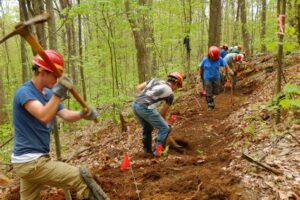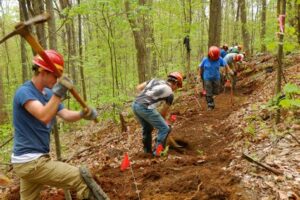Table of Contents
Explore the world of biology and make a positive impact through volunteer work. Engage in hands-on experiences that contribute to research, conservation, and education. Enhance your knowledge of ecosystems, biodiversity, and wildlife while working alongside experts in the field. Join biology-related volunteer programs to gain valuable skills, expand your network, and contribute to the preservation of our planet’s natural wonders.
Engaging in biology-related volunteer work is an incredibly rewarding experience that allows individuals to make a tangible difference in the field of science. Whether it is assisting with research projects, working in wildlife conservation, or educating others about the importance of biodiversity, there are numerous opportunities to contribute to the advancement of biological knowledge. By dedicating their time and expertise to these endeavors, volunteers not only gain valuable skills and knowledge but also foster a deep sense of fulfillment and purpose. With the chance to collaborate with like-minded professionals and actively participate in meaningful initiatives, biology-related volunteer work offers an unparalleled avenue for personal and professional growth.
The Importance of Biology Related Volunteer Work
In the field of biology, volunteer work plays a crucial role in advancing scientific knowledge, conserving natural resources, and promoting environmental awareness. Through hands-on experiences and collaboration with professionals, volunteers have the opportunity to make a meaningful impact on various aspects of biology. Whether it’s assisting with wildlife conservation efforts or conducting research on endangered species, biology-related volunteer work offers unique opportunities for individuals to contribute to the betterment of our natural world.
1. Conservation and Rehabilitation Programs
One of the most popular forms of biology-related volunteer work is participating in conservation and rehabilitation programs. These initiatives aim to protect and restore ecosystems, preserve biodiversity, and rehabilitate injured animals. Volunteers may assist with habitat restoration, animal tracking, or even participate in hands-on activities such as animal rescue and release. By actively contributing to these programs, volunteers play a vital role in safeguarding the delicate balance of our ecosystems.
2. Citizen Science Projects
Citizen science projects provide an excellent opportunity for biology enthusiasts to get involved in scientific research. These projects involve collecting data and conducting experiments under the guidance of professional scientists. By participating in citizen science initiatives, volunteers contribute to important research studies, monitoring biodiversity, and tracking the impacts of environmental changes. This involvement not only helps advance scientific knowledge but also fosters a sense of responsibility and engagement with the natural world.
3. Education and Outreach Programs
Education and outreach programs are essential for raising awareness about biology-related issues and fostering environmental stewardship. Volunteers in these programs often assist in organizing workshops, giving presentations, or leading guided nature walks. By sharing their knowledge and passion for biology, volunteers inspire others to appreciate and protect the natural world. These programs also provide valuable opportunities for volunteers to develop their communication and leadership skills.
4. Marine Conservation Projects
For those who are particularly interested in marine biology, volunteer work in marine conservation projects can be immensely rewarding. Opportunities often include assisting in coral reef restoration, sea turtle monitoring, or marine debris clean-ups. By actively participating in these projects, volunteers contribute to the preservation of fragile marine ecosystems and help protect endangered species that rely on these habitats.
5. Research and Fieldwork Assistance
Volunteering in research and fieldwork projects allows individuals to gain hands-on experience in conducting scientific studies. Whether it’s assisting with data collection, sample analysis, or field observations, volunteers play a vital role in supporting ongoing research efforts. This involvement not only provides valuable learning opportunities but also contributes to the overall progress of scientific understanding in various biological disciplines.
6. Wildlife Rehabilitation Centers
Wildlife rehabilitation centers provide care and treatment for injured or orphaned animals. Volunteers in these centers assist in feeding, cleaning enclosures, and providing enrichment activities for the animals under the supervision of trained professionals. By volunteering in these centers, individuals contribute to the recovery and release of wildlife back into their natural habitats, ensuring their survival and well-being.
7. Botanical Gardens and Arboretums
Volunteering at botanical gardens and arboretums offers an opportunity to learn about plant biology and conservation. Volunteers may assist in planting, maintaining, and researching different plant species. They may also engage in educational activities, guiding visitors on tours or organizing workshops on sustainable gardening practices. Through their involvement, volunteers contribute to the preservation and appreciation of diverse plant life.
8. Environmental Cleanup Initiatives
Participating in environmental cleanup initiatives is a practical way to contribute to biology-related volunteer work. Volunteers help remove litter and debris from natural areas, rivers, and coastlines. By doing so, they prevent pollution, protect wildlife from harm, and restore the beauty of these environments for future generations. Environmental cleanup initiatives not only benefit the local ecosystems but also raise awareness about the importance of waste reduction and responsible disposal.
9. Animal Sanctuaries and Reserves
Volunteering at animal sanctuaries and reserves provides an opportunity to support the well-being and conservation of various species. Volunteers may assist in feeding, grooming, and providing enrichment activities for animals under the guidance of experienced caretakers. This hands-on involvement not only benefits the animals but also allows volunteers to learn about the importance of habitat preservation and ethical treatment of wildlife.
10. Community Gardens and Urban Farming
Getting involved in community gardens and urban farming initiatives is another way to engage in biology-related volunteer work. Volunteers participate in planting, maintaining, and harvesting crops while learning about sustainable agriculture practices. These projects often promote food security, environmental education, and community engagement. Through their involvement, volunteers can contribute to local food production, create green spaces, and foster a sense of community.
In conclusion, biology-related volunteer work offers a wide range of opportunities for individuals to contribute to scientific research, conservation efforts, and environmental education. By actively participating in these initiatives, volunteers can make a meaningful impact on the natural world while gaining valuable knowledge and skills. Whether it’s through conservation programs, research assistance, or education initiatives, volunteering in biology-related fields allows individuals to foster a deeper connection with nature and contribute to the betterment of our planet.
Research Assistant at a Biomedical Lab
As a volunteer research assistant at a prestigious biomedical lab, I had the opportunity to work alongside a team of dedicated scientists. My responsibilities included assisting in conducting experiments, analyzing data, and compiling research reports. This experience provided me with valuable insights into the intricacies of molecular biology and allowed me to develop a strong foundation in laboratory techniques. By actively engaging in hands-on research, I gained practical knowledge that complemented my academic studies and prepared me for future endeavors in the field of biology.
Environmental Conservation Project Coordinator
As an environmental conservation project coordinator, I took on the responsibility of organizing and leading volunteer teams in various fieldwork activities. These activities ranged from conducting ecological surveys to participating in habitat restoration and wildlife monitoring efforts. Through these experiences, I not only contributed to the preservation and restoration of local ecosystems but also enhanced my knowledge of biodiversity and ecological systems. Working closely with other volunteers and experts in the field, I developed a deep appreciation for the interconnectedness of all living organisms and the importance of sustainable practices in preserving our natural environment.
Volunteer Educator at a Science Museum
As a volunteer educator at a science museum, my role was to facilitate interactive workshops, guide tours, and conduct science demonstrations aimed at fostering interest and understanding of biological concepts among visitors of all ages. This experience allowed me to effectively communicate complex scientific principles in a way that was accessible and engaging. It also provided me with the opportunity to enhance my presentation and public speaking skills. By sharing my passion for biology with others, I hoped to inspire the next generation of scientists and promote scientific literacy within the community.
Animal Rehabilitation Volunteer
As an animal rehabilitation volunteer, I had the privilege of assisting in the care and rehabilitation of injured or orphaned wildlife. This involved providing them with proper nutrition, medical treatment, and monitoring their progress towards recovery. Through this role, I gained a deep appreciation for the delicate balance of ecosystems and the importance of wildlife conservation. It also allowed me to witness firsthand the resilience of animals and the impact that human intervention can have on their well-being. By actively participating in this volunteer work, I not only contributed to the preservation of local wildlife but also developed a sense of empathy and responsibility towards the natural world.
Community Health Outreach Volunteer
As a community health outreach volunteer, I collaborated with healthcare professionals to organize and implement programs aimed at promoting health education and awareness within the community. With a focus on biological aspects such as disease prevention, nutrition, and reproductive health, I played a vital role in addressing pressing community health issues. Through this volunteer work, I had the opportunity to make a positive impact on the lives of individuals and families in need. It also allowed me to gain a deeper understanding of the social determinants of health and the importance of community engagement in promoting overall well-being.
Botanical Garden Volunteer
As a volunteer at a botanical garden, my responsibilities included engaging in various horticultural tasks such as planting, pruning, weeding, and maintaining the overall health of plants. This hands-on experience provided me with a deeper understanding of plant biology, taxonomy, and sustainable gardening practices. Working in a botanical garden setting allowed me to appreciate the vital role that plants play in supporting ecosystems and maintaining biodiversity. It also provided me with a platform to educate visitors about the importance of conserving plant species and the benefits they provide to the environment and human society.
Genetics Counseling Support Volunteer
As a genetics counseling support volunteer, I provided emotional and informational support to patients and families undergoing genetic testing or dealing with genetic disorders. Working closely with genetic counselors, I gained a deeper understanding of the ethical implications of genetic research while offering support to individuals navigating complex medical decisions. This volunteer work allowed me to witness the profound impact that genetics can have on individuals and families, and it reinforced my commitment to promoting compassionate and patient-centered care in the field of biology.
Science Writing Volunteer for Biological Publications
As a science writing volunteer, I had the opportunity to contribute to biological publications by researching and writing articles on various topics within the field of biology. This experience allowed me to refine my scientific writing skills and effectively communicate complex concepts to a broader audience. It also provided me with the opportunity to stay up-to-date with the latest advancements in the field and engage in critical analysis of scientific literature. By actively participating in science writing, I aimed to bridge the gap between scientific research and the general public, promoting a better understanding and appreciation of biology in society.
Volunteering in biology-related work provides a unique opportunity to contribute to scientific research and conservation efforts. Engaging in such volunteer work allows individuals to gain practical experience, expand their knowledge, and make a positive impact on the environment and society as a whole.
When volunteering in biology-related work, it is essential to maintain a professional voice and tone. This demonstrates a commitment to the field and helps build credibility among fellow scientists and researchers. Here are some key points to consider:
- Expertise: As a volunteer, it is crucial to showcase your expertise and knowledge in the field of biology. This can be achieved by staying updated with the latest research, attending relevant workshops or conferences, and actively participating in discussions with professionals in the field.
- Responsibility: Showing responsibility is vital when engaging in biology-related volunteer work. This includes adhering to safety protocols, following ethical guidelines, and ensuring the well-being of the organisms or ecosystems being studied. Taking ownership of tasks and delivering them in a timely manner also demonstrates professionalism.
- Communication: Effective communication skills are essential when working in a biology-related volunteer setting. Whether it is collaborating with other volunteers, researchers, or presenting findings, maintaining a professional tone in both written and verbal communication is crucial. Clear and concise communication helps convey ideas and information accurately.
- Adaptability: The field of biology often presents unexpected challenges and changes. Demonstrating adaptability in various situations shows professionalism and a willingness to learn. Being open to new ideas, techniques, and approaches can enhance the overall volunteer experience and contribute to the success of the project.
- Ethics and Integrity: Upholding high ethical standards and integrity is paramount in biology-related volunteer work. This involves respecting confidentiality, acknowledging the work of others, and ensuring the accuracy of data collected. Being honest, transparent, and accountable for one’s actions fosters a professional environment and strengthens relationships with fellow volunteers and researchers.
- Continuous Learning: Engaging in biology-related volunteer work provides an opportunity to expand knowledge and skills. Demonstrating a commitment to continuous learning by seeking feedback, asking questions, and actively participating in training programs or workshops enhances professionalism. It also reflects a genuine passion for the field of biology.
Overall, maintaining a professional voice and tone when volunteering in biology-related work is essential for personal growth, contributing to scientific advancements, and making a positive impact on the environment. By exhibiting expertise, responsibility, effective communication, adaptability, ethics, integrity, and a commitment to continuous learning, volunteers can enhance their experience and contribute meaningfully to the field of biology.
Thank you for taking the time to visit our blog and explore the exciting world of biology-related volunteer work. We hope that the information we have shared has sparked your interest and inspired you to consider getting involved in this rewarding field. Whether you are a student looking to gain practical experience or a passionate individual seeking to make a difference, volunteering in biology can offer you a unique opportunity to contribute to scientific research, conservation efforts, and community outreach programs.
Firstly, volunteering in biology allows you to directly contribute to important scientific research projects. Many organizations and research institutions rely on the support of volunteers to help collect data, conduct experiments, and analyze results. By participating in such projects, you will not only enhance your knowledge and skills in various scientific methodologies but also make a valuable contribution to advancing our understanding of the natural world. This hands-on experience can be extremely beneficial for those pursuing a career in biology or related fields, as it provides practical training that cannot be gained solely through classroom education.
Moreover, engaging in biology-related volunteer work enables you to actively participate in conservation efforts. There are numerous opportunities to get involved in projects focused on protecting endangered species, restoring habitats, and promoting sustainable practices. By dedicating your time and energy to these initiatives, you will become an advocate for the preservation of biodiversity and the environment. Volunteering in conservation not only benefits the ecosystems and species being protected but also instills a sense of responsibility and stewardship towards our planet.
Lastly, volunteering in biology offers a chance to engage with the community and inspire others to appreciate the wonders of the natural world. Many organizations organize outreach programs and educational initiatives to raise awareness about biology and environmental issues. As a volunteer, you can play a crucial role in organizing workshops, leading nature walks, or delivering presentations to diverse audiences. By sharing your knowledge and passion, you have the power to inspire future generations and cultivate a love for biology in others.
Ultimately, volunteering in biology is a fulfilling experience that not only expands your knowledge and skills but also allows you to contribute to scientific research, conservation efforts, and community engagement. If you are interested in getting involved, we encourage you to reach out to local organizations, research institutions, or universities to explore the various opportunities available. Remember, every small action can make a big impact, so seize the chance to be part of something greater and embark on a biology-related volunteer journey today!
Video Biology Related Volunteer Work
1. What are some biology-related volunteer opportunities available?
Some biology-related volunteer opportunities include:
- Assisting in wildlife conservation projects
- Participating in marine biology research
- Volunteering at animal shelters or wildlife rehabilitation centers
- Contributing to environmental clean-up initiatives
- Supporting community gardens or urban farming projects
2. How can volunteering in biology-related activities benefit me?
Volunteering in biology-related activities can provide several benefits:
- Hands-on experience and practical skills development
- Networking opportunities with professionals in the field
- A chance to make a positive impact on the environment or wildlife
- Enhanced understanding of biological concepts through practical application
- Opportunities to explore potential career paths in biology
3. Where can I find biology-related volunteer opportunities?
You can find biology-related volunteer opportunities through various avenues:
- Local environmental organizations or wildlife conservation groups
- University or college biology departments
- Online platforms dedicated to connecting volunteers with biology-related projects
- Animal shelters or wildlife rehabilitation centers in your area
- Community gardens or urban farming initiatives
4. Do I need prior biology knowledge or experience to volunteer in biology-related activities?
Prior biology knowledge or experience may not always be required for volunteering in biology-related activities. Many organizations offer training or introductory programs to help volunteers get acquainted with the tasks involved. However, having a basic understanding of biology concepts can be beneficial and allow you to contribute more effectively.
5. Can volunteering in biology-related activities lead to career opportunities?
Volunteering in biology-related activities can certainly open doors to potential career opportunities. It provides valuable experience, networking connections, and a chance to demonstrate your passion and commitment to the field. Many professionals in biology have started their careers by volunteering and later transitioned into paid positions or pursued further education and research in the field.






